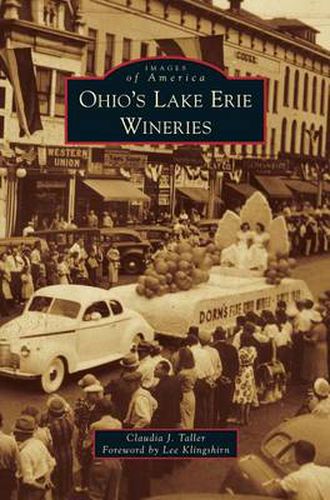Readings Newsletter
Become a Readings Member to make your shopping experience even easier.
Sign in or sign up for free!
You’re not far away from qualifying for FREE standard shipping within Australia
You’ve qualified for FREE standard shipping within Australia
The cart is loading…






This title is printed to order. This book may have been self-published. If so, we cannot guarantee the quality of the content. In the main most books will have gone through the editing process however some may not. We therefore suggest that you be aware of this before ordering this book. If in doubt check either the author or publisher’s details as we are unable to accept any returns unless they are faulty. Please contact us if you have any questions.
Ohio’s Lake Erie wineries and vineyards are rooted in tradition. European immigrants settled on the Lake Erie islands and nearby shoreline in the mid-1800s, and the grape industry flourished in Ohio into the early 20th century. Industrialization from Cleveland to Toledo swallowed up prime growing property along the lakeshore, but many farms continued to grow grapes. During Prohibition, wine making went underground. When it ended, restaurant owners bottled their own fortified wines and some of the wineries started mass producing wine with new equipment. The wines of Ohio, like those all over the eastern United States, were mostly sweet and made from native labrusca grapes. In the 1960s, Ohio’s serious winemakers learned how to cultivate European-style vinifera grapes along Lake Erie’s shore and on the islands. Chardonnay and cabernet sauvignon grapes now grow alongside Concord and Catawba. Today, more than 40 wineries stretch across northern Ohio.
$9.00 standard shipping within Australia
FREE standard shipping within Australia for orders over $100.00
Express & International shipping calculated at checkout
This title is printed to order. This book may have been self-published. If so, we cannot guarantee the quality of the content. In the main most books will have gone through the editing process however some may not. We therefore suggest that you be aware of this before ordering this book. If in doubt check either the author or publisher’s details as we are unable to accept any returns unless they are faulty. Please contact us if you have any questions.
Ohio’s Lake Erie wineries and vineyards are rooted in tradition. European immigrants settled on the Lake Erie islands and nearby shoreline in the mid-1800s, and the grape industry flourished in Ohio into the early 20th century. Industrialization from Cleveland to Toledo swallowed up prime growing property along the lakeshore, but many farms continued to grow grapes. During Prohibition, wine making went underground. When it ended, restaurant owners bottled their own fortified wines and some of the wineries started mass producing wine with new equipment. The wines of Ohio, like those all over the eastern United States, were mostly sweet and made from native labrusca grapes. In the 1960s, Ohio’s serious winemakers learned how to cultivate European-style vinifera grapes along Lake Erie’s shore and on the islands. Chardonnay and cabernet sauvignon grapes now grow alongside Concord and Catawba. Today, more than 40 wineries stretch across northern Ohio.